by Jenny Rose | Oct 25, 2018 | A Flourishing Woman, Spirit
The last time my job necessitated driving in the dark, I was a young married woman. I worked afternoons and evenings in a hospital in a large city and drove home on well-lit highways and city streets after the chaos of evening rush hour. I never left the hospital after dark without Security, who saw me safely to my car.

Photo by Peter Forster on Unsplash
As a child I was terrified of the dark. I was a fearful child in general and the dark was the culmination of every nameless horror, imagined and real. Somewhere in the years of early motherhood when I became a single parent my fear of the dark vanished and it became my friend — a place of peace, rest and privacy. It shielded me from critical eyes and harsh words.
If no one could see me or find me, they wouldn’t discover what a failure I was.
After some years of friendship the dark became my lover, and I adorned it with candlelight, welcomed starlight onto my pillow and delighted in night walks. I feel strangely at one with the pale, musky blur of the skunk; the large clumsy rustling and noisy chewing of the bear eating windfall apples and the kingly owls conversing solemnly overhead. The warmly-lit world inside where people talk, laugh, and live their lives is another universe and I a wild, aloof creature, silent and unseen under the grandeur of the night sky.
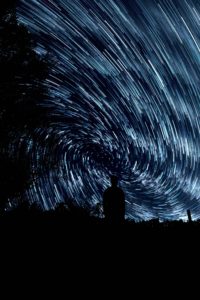
Photo by Jeremy Thomas on Unsplash
Miracles happen in the dark.
Now I’m driving in the dark again, slipping through the folds and creases of the hills, passing over the river and gliding under the half-naked trees. The small city’s lights glow dimly, behind me if I’m going home after closing the pool, ahead of me if I’m coming in early to open it. The pavement undulates and curves, unfolding under my headlights. Lit windows give me intimate glimpses of people moving around in kitchens and living rooms, sipping from a cup, glancing at a TV screen. Other drivers are out, too, strung loosely along the road. Oncoming headlights force my gaze to the shoulder, scanning for hapless porcupines, impulsive deer or careless pedestrians.
Last night, an almost perfect Hunter’s Moon rose over a stubbled field where corn grew a few weeks ago, lighting a black and white vista of fields and scattered trees. It hung low, gleaming through bare branches, silvering my right shoulder as it saw me home. As I backed into the driveway to park under the friendly light at the apex of the barn roof, moonlight flooded in my windshield as though embracing me before I opened the cellar door and stepped inside the house, no longer half fey and wild but my usual civilized and responsible self.
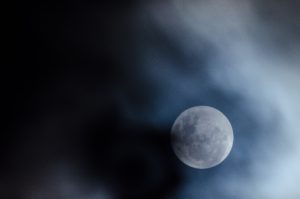
Photo by Linda Xu on Unsplash
This morning, snow and leaves whirled in my headlights and my tires hissed on the wet road. The trees hunched, dark indistinct shapes, and the river was invisible as I crossed the bridge. I opened the car window for the pleasure of the wet snowflakes on my face, the damp autumn smell and the cold lash of dark air on my cheeks. I might have been the only living human being in the world. For a moment I wished it was so. I might have been going anywhere or nowhere through the darkness, the snow and the leaves. It seemed perfectly possible to stop the car and abandon it, to fling myself into the arms of the landscape and disappear into wood, stone, hair and bone.
Yet ahead lay the swimming pool, waiting in the humid darkness of its building for lights to discover it, for people to measure and balance its chemicals, for computer screens to come to life, for the daily schedule to be printed and the showers to be run to prime the hot water. In the town ahead were therapy patients, members of the early water aerobics class and crack-of-dawn lap swimmers. I drive through the dark for them.
So I shook off the wistful feeling that there are other ways to live, deeper, older and more magical, shut the car window and drove on, through the waking town under the dim dawn sky, heavy with downy snow, and stepped into the humid warmth and sound of the swimming pool, blue and white and brightly lit. The darkness and I parted for a time, but it has a piece of me I can give to no one and nothing else. The dark is a lover unlike any other.
I will always return to it.
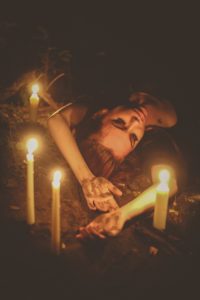
Photo by Miranda Wipperfurth on Unsplash
All content on this site ©2018
Jennifer Rose
except where otherwise noted
by Jenny Rose | Jun 22, 2017 | A Flourishing Woman, Self-Love
Recently I went back to the little mountain town in the Southern Colorado Rockies I called home for twenty years, and wrapped up the sale of my house. It was an important trip for me, one which I’ve been anticipating ever since I arrived in Maine two and a half years ago. My partner and I drove out and drove back. I didn’t try to blog or write on the road, but I made a lot of notes and I discovered a persistent theme.
Reclamation, according to a quickie internet search, means “the process of claiming something back or of reasserting a right” or “the cultivation of waste land or land formerly under water.” It strikes me there’s an interesting and subtle possibility of conflict in those two definitions. What exactly is waste land, and who has the power to define it? Also, what does cultivation mean? Big Ag? Monocropping? Pesticides and Roundup? Or cultivation by plants, animals and wind?
In any event, I’ve been carrying the word reclamation for some years now like a talisman. It’s a cord linking events and choices of the last years of my life together.

Photo by Tanja Heffner on Unsplash
I remember exactly when it started. I was sitting in a chair in the salon where a friend cut my hair for years. In the mirror, I could see my hair falling over my shoulders and down my back, thick and wavy and beginning to be streaked with grey. I was desolate because of a broken relationship, and I saw a woman who was unwanted in that mirror. I didn’t want to be her anymore. I wanted to be someone else. My friend asked me what I wanted to do and I told her to cut it all off. “Reclamation,” I said. I couldn’t say more because I didn’t want to break into sobs, but she knew exactly what I meant, and she tied a smock around my neck and started cutting.
My ex-boyfriend had loved my hair. I loved it, too. It made me feel sexy and beautiful and feminine. Cutting it was the first step I took on the road leading me to this attic space in central Maine, where I sit this summer morning (with short hair) writing with the windows open and the sound of crickets, frogs and birds flowing in.
I held onto that word, reclamation. It became a boat to sail away in, and then a lifeboat, and then a raft and then a spar of wood in a fathomless sea of floating debris that kept me alive until current and waves took me back to shore.
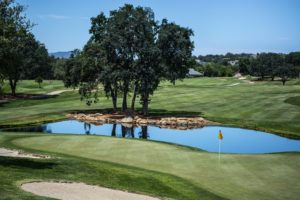
Photo by Edewaa Foster on Unsplash
The little town I lived in had no claim to fame or big dollar tourism except for a golf course. When I moved there the course was renowned for being one of the most beautiful in the country, and visitors came from all over during the summer to play there, filling the inns and RV parks. Then drought struck that part of Colorado, the golf course was sold to an absentee owner who immediately got crosswise with the town, and gradually, due to a mixture of water problems, politics and general assholery on the part of the owner, the golf course went downhill, people lost jobs, the greens became unkempt and the tourists stopped coming. Then, just about the time I left town, the golf course closed.
I don’t play golf and my living fortunately didn’t depend on the tourist trade, but every morning, just before dawn, I walked on the golf course.
I didn’t do it for exercise or as a discipline. It was my lifeline. It was the one place where I never failed. I was guaranteed solitude and peace. Nobody knew where I was. I knew the course so well I could disappear into it, be absorbed. I had several routes, one for ordinary days, one for days of grief, one for days of rage and the longest one for days of despair. I used some of the cart paths, but mostly I followed the contours and edges of the greens and walked along the river, which was generally only a trickle, if not entirely dry. I often heard owls going to roost as meadowlarks began their morning chorus. I saw bears, foxes, skunks, deer and geese.
In the days of relative plenty, maintenance men worked as early as I was walking, but I was a familiar local figure and we ignored each other. I avoided them and they only saw me at a distance. There was an elaborate sprinkler system, of course, that worked all night every night and made the whole place fresh and green and cool, a stark contrast to my daily reality of hauling or pumping grey water out to my garden because of drought and watering restrictions. I lived a five-minute walk away.
During our recent trip we only spent one night in that little town, but I woke early, slid into my clothes and walked to the golf course. I knew it had been closed altogether for some time. This year the drought momentarily broke in the valley with record amounts of snow and rain, and the river that so often dried up flooded, both on the course and through the town. As I slipped through the gates and passed the “no trespassing” signs in the dark of early dawn, I could hear the river, an amazing, miraculous sound. The scent and chill kiss in the air of running water was very different from the mechanical chik, chik, chik of an automatic sprinkler.
The cart path was rutted, muddy and overgrown. Large tree limbs had fallen and nobody cleared them away. The river actually broke out of its banks and spread across a former green. I’d seen pictures in the local paper, but I still couldn’t believe my eyes. The town sent in machinery to make barriers out of heaped-up debris and mud. Whole trees had toppled, their root balls pathetically exposed to the sky.
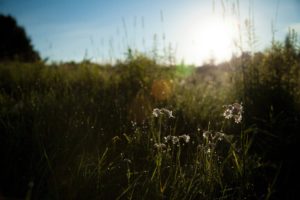
Photo by Alejandro Escamilla on Unsplash
Once, I could have walked several paths on the golf course blindfolded. I often was there in the dark. Now my footing was uncertain. The grass grew up to my waist and I kept tripping over hidden windfall branches. Weeds filled the sand traps. The greens were, of course, gone. The groomed contours that once marked my route had vanished, forcing me to slow down and move more cautiously. I strained my eyes to discover familiar slopes and hollows in the dim light.
As I moved deeper into the old course, I thought of all the hundreds of mornings I’ve spent there, praying, weeping, raging, pressing myself against nature in every mood and season. I took my joy there, my hope, my dreams, and my gratitude practice. The golf course was a place of creative inspiration, a place of guidance and comfort, a place in which to staunch wounds enough to carry on another day. I was real there. I didn’t try to hide from myself.
That highly-groomed, herbicide-gagged, shaved, enslaved, money-making piece of land (a waste land) is going wild again. It was captured, bought, and pimped by a businessman in order to create a profit. Now, Mother Nature reclaims her own. The land begins to remember itself. As I walked and the light increased, showing me myriad signs of healing, I felt akin to the land. What is happening there is happening to me. I had a pimp, too — myself. I sold myself for what I thought I was worth in order to get what I needed. Now the land and I reclaim ourselves from a bleak and limited culture that relies on chemicals, profit and power-over rather than natural cycles and cooperation.
Reclamation is not a controlled, civilized process. It’s wild, sometimes catastrophic. The river made a scar where it broke its banks and uprooted trees, but it carved out a new bed for itself. The old bed will fill in. New growth will cover all that exposed earth. The downed limbs and trees will rot and feed the soil and mycelium while native plants and grasses return. Is this what we mean by waste land? Forest fire, flood and storm are acts of nature that reshape the land and environment. Life dies and renews, one act leading to the other. We often experience reclamation as terrifying and tragic. Human beings, for the most part, don’t welcome change unless we control it.
Yet we do change. The world changes. The weather changes. Those around us change. We can neither stop nor control it in any significant way, and I’m entirely grateful for that. The golf course and I are messy. Our hair is disheveled. Our trim, neat lines are blurred. The high unmown grass through which I waded brushed against the hair on my bare legs. The water feeding the land and the water of feeling that feeds me have carved a new, wider path. Bridges and trees sag and unravel, not trash but compost for the next thing. Paths and fences fall into disrepair. Grass and saplings mingle freely, each reaching toward the other at the edges.
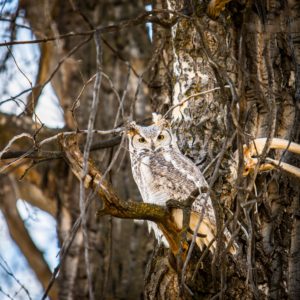
Photo by Laterjay Photography on Unsplash
Snakes, rabbits and insects live again in the shelter of the grasses. Does can leave their fawns safely concealed while they browse, and their presence will bring the mountain lions down from the foothills. Owls will find abundant mice, voles and other rodents in what was a carpet of sterile green velvet. The beaver and raccoons will no longer be trapped or shot, lest they disturb the regulated beauty of the water features or annoy the tourists. Over all this complex, creative system, the meadowlark still sings, that king of the high fields and plains, and his song still brings tears to my eyes and an ache to my throat.
That land will always be home to the woman I was. I was glad to return for a brief hour and realize my beloved place has moved on, just as I have. The land and I were both over-civilized into waste land, but now we’re reclaiming ourselves. The golf course and I reassert our right to be what we are. We surrender to change, to mess, and to the transformative edge of chaos.
All content on this site ©2017
Jennifer Rose
except where otherwise noted







